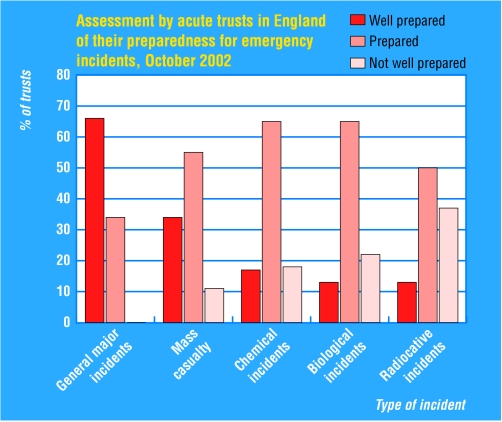A fifth of NHS hospital and ambulance trusts in England are inadequately prepared to cope with major terrorist incidents, warned a report published by the National Audit Office last week.
The report found that the NHS was well prepared to cope with previously encountered major incidents, such as rail and plane crashes, but that many hospital and ambulance trusts did not have adequate plans to deal with a major biological, chemical, or nuclear attack. Information was collected from surveys of all health authorities, acute trusts, and ambulance trusts in August 2001, February 2002, and October 2002. Response rates for the surveys were at least 60%.
Results showed that at least one in five major hospitals and ambulance services was “not well prepared” to deal with emergencies involving chemical, biological, or nuclear weapons or radioactive materials. These figures showed little progress from August 2001 in the 91 trusts that responded to both the 2002 surveys.
London was found to be better prepared after the 11 September 2001 attacks than before, but the October 2002 survey showed that a third of acute trusts and the London Ambulance Service were considered still “not well prepared” to deal with a major incident involving radioactivity. “A mass casualty incident or hazardous substances incident on a large scale would challenge the NHS in London,” the report stated.
The comptroller and auditor general, Sir John Bourn, who is head of the National Audit Office, said: “I recognise that there are limits to what can be done in improving readiness.
“However, the nature of the threats now potentially facing us means that the Department of Health and the chief executives of hospital, ambulance, and primary care trusts need to continue to act with determination to improve their planning and readiness.”
The report recommended that the Department of Health should provide guidance on how to develop plans for dealing with major incidents and commission a training strategy for dealing with major incidents, particularly incidents involving the deliberate release of hazardous substances.
The chief medical officer, Professor Liam Donaldson, replied: “While it is impossible to protect the public against every possible incident, the NHS is better prepared than ever—but we know there is still work to do.
“That is why we are in the process of creating a national agency—the Health Protection Agency.” 
Footnotes
Facing the Challenge: NHS Emergency Planning in England is available from the Stationery Office, tel 0845 702 3474 or at www.nao.gov.uk


